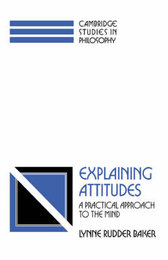
|
Explaining Attitudes: A Practical Approach to the Mind
Paperback / softback
Main Details
| Title |
Explaining Attitudes: A Practical Approach to the Mind
|
| Authors and Contributors |
By (author) Lynne Rudder Baker
|
| Series | Cambridge Studies in Philosophy |
|---|
| Physical Properties |
| Format:Paperback / softback | | Pages:264 | | Dimensions(mm): Height 216,Width 140 |
|
| Category/Genre | Philosophy - epistemology and theory of knowledge
Ethics and moral philosophy |
|---|
| ISBN/Barcode |
9780521421904
|
| Classifications | Dewey:121.6 |
|---|
| Audience | | Professional & Vocational | | Tertiary Education (US: College) | |
|---|
| Illustrations |
Worked examples or Exercises
|
|
Publishing Details |
| Publisher |
Cambridge University Press
|
| Imprint |
Cambridge University Press
|
| Publication Date |
27 January 1995 |
| Publication Country |
United Kingdom
|
Description
Explaining Attitudes offers a timely and important challenge to the dominant conception of belief found in the work of such philosophers as Dretske and Fodor. According to this dominant view, beliefs, if they exist at all, are constituted by states of the brain. Rudder Baker rejects this view and replaces it with a quite different approach: practical realism. Seen from the perspective of practical realism, any argument that tries to interpret beliefs as either brain states or immaterial souls is a false dichotomy. Practical realism takes beliefs to be states of whole persons, rather like states of health. What a person believes is determined by what a person would do, say, and think in various circumstances. Thus beliefs and other attitudes are interwoven into an integrated, commonsensical conception of reality.
Author Biography
Lynne Rudder Baker is Distinguished Professor of Philosophy at the University of Massachusetts, Amherst. She is the author of Explaining Attitudes (Cambridge UP, 1995), Persons and Bodies (Cambridge UP, 2000), The Metaphysics of Everyday Life (Cambridge UP, 2007), and Saving Belief (Princeton UP, 1987).
Reviews"The discussions are always interesting, and at times profound and foundational. It provides a contrasting voice in an otherwise too one-sided discussion; everyone now working in the philosophy of mind should read it." Anne Jasp Jacobson, Canadian Philosophical Review
|